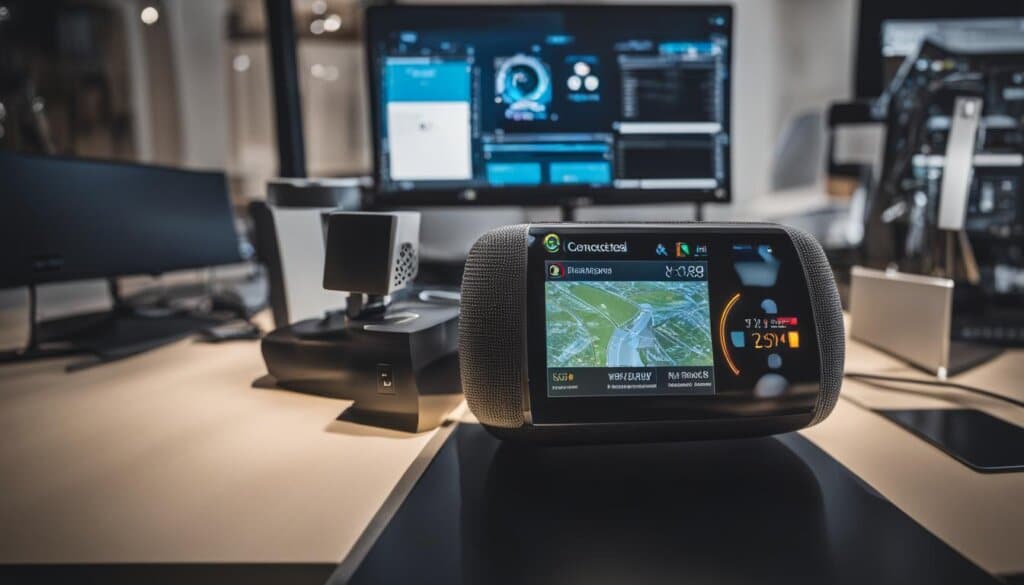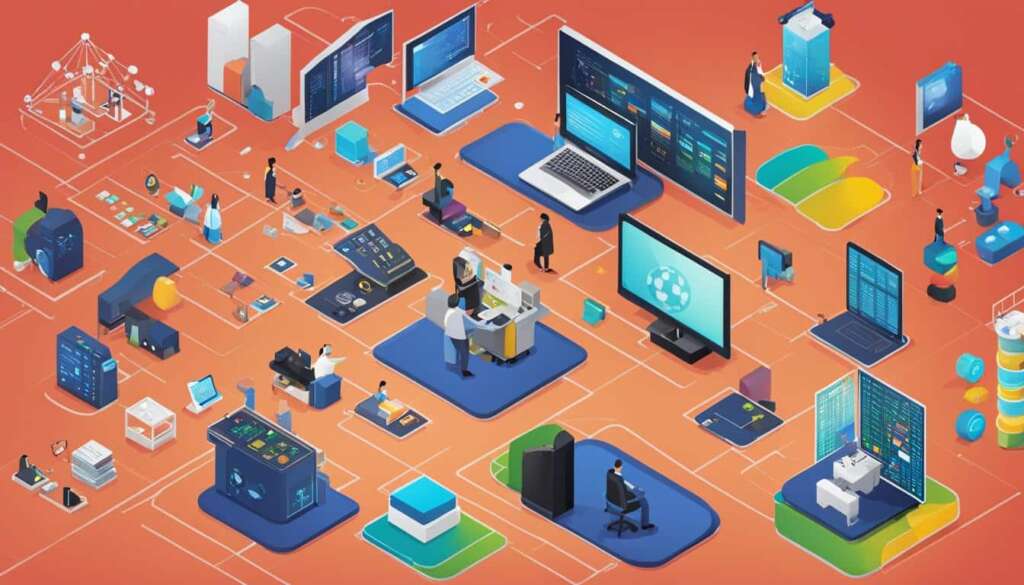Table of Contents
Linux, an open-source operating system, offers a wide array of practical uses and applications in various industries. Its versatility and flexibility make it a reliable choice for businesses and individuals alike.
Linux finds extensive application across different sectors, including web servers, scientific research, embedded systems, and more. Let’s explore the diverse ways in which Linux contributes to these industries and enhances their operations.
In the following sections, we will delve into the specific uses of Linux in each field, highlighting its benefits and real-world applications.
Continue reading to discover how Linux powers web servers, supercomputers, embedded systems, and even retro gaming platforms. Whether you’re a tech enthusiast, a business owner, or a curious learner, understanding Linux’s role in different industries can broaden your knowledge and inspire new possibilities.
Linux in Web Servers and Data Centers
Linux has a strong presence in the world of web servers and data centers. It dominates the market as the operating system of choice for web servers, with the majority of websites running on Linux-based servers. This significant Linux dominance can be attributed to several factors.
Firstly, Linux offers a cost-effective solution for hosting websites. As an open-source operating system, Linux is free to download and use, allowing organizations to save on licensing costs. This affordability is particularly appealing to small businesses and startups looking to establish an online presence.
Additionally, Linux’s compatibility with popular open-source software, such as Apache, further strengthens its position as the preferred choice for web servers. Apache, the most widely used web server software, is specifically designed to run on Linux. The seamless integration between Linux and Apache ensures optimal performance and stability for hosting websites.
Furthermore, Linux outnumbers Windows servers in data centers. This can be attributed to the scalability and flexibility offered by Linux. It can run on a wide range of hardware architectures, allowing organizations to choose the hardware that best suits their needs. The ability to run on diverse hardware options translates into cost savings and greater versatility for data center administrators.
Let’s take a look at a comparison between Linux and Windows servers in data centers:
| Aspect | Linux Servers | Windows Servers |
|---|---|---|
| Licensing Costs | Lower, often free | Higher, requires licensing |
| Hardware Compatibility | Wide range of hardware options | Limited hardware support |
| Stability and Reliability | Highly stable and reliable | Can experience occasional stability issues |
| Community and Support | Large community and extensive support | Support availability varies |
In conclusion, Linux’s dominance in the web server and data center space is evident. Its cost-effectiveness, compatibility with open-source software, and ability to run on various hardware architectures make it an attractive choice for hosting websites and managing data centers. With the constant updates and improvements in the Linux ecosystem, it is expected to maintain its stronghold in the industry for years to come.
Linux in Supercomputers and Scientific Research
Linux has become the operating system of choice for supercomputers, with almost all current installations running some version of Linux. Its affordability and compatibility with standard hardware have made it the preferred platform for complex calculations and research applications. In the world of scientific research, Linux adoption has been pivotal in driving significant breakthroughs and advancements.
One remarkable example of Linux’s impact in scientific research is its role in the development of COVID-19 vaccines. Supercomputers powered by Linux played a crucial part in accelerating the study of the virus, analyzing its genetic makeup, and simulating potential vaccine candidates. These supercomputers provided the necessary computing power and scalability to process vast amounts of data, significantly expediting the research process.
The adoption of Linux in scientific research extends beyond vaccine development. Researchers utilize Linux-powered supercomputers for a wide range of applications, such as weather forecasting, climate modeling, astrophysics simulations, and genomics research. The versatility of Linux allows scientists to tailor their software and algorithms to specific research needs, enabling them to push the boundaries of knowledge in their respective fields.
“Linux and open-source software have revolutionized the field of scientific research, providing researchers with powerful tools and capabilities. The scalability, performance, and cost-effectiveness of Linux in supercomputers have paved the way for groundbreaking discoveries and innovations.”
Here is a comparison table showcasing the usage of Linux in supercomputers and its adoption in scientific research:
| Linux in Supercomputers | Linux in Scientific Research |
|---|---|
| Almost all supercomputers run Linux-based operating systems. | Scientists extensively use Linux-powered supercomputers for complex calculations and data analysis in various disciplines. |
| Linux offers a high degree of customization and optimization for specific computing needs. | Linux allows researchers to tailor software and algorithms to their specific research requirements, leading to more accurate and efficient simulations. |
| Linux-powered supercomputers provide the necessary computing power to process vast amounts of data quickly. | Linux enables scientists to analyze large datasets, study complex phenomena, and simulate real-world scenarios. |
| Linux’s open-source nature encourages collaboration and sharing of research findings. | Scientists can leverage open-source tools and libraries to accelerate their research and build upon existing knowledge. |
The exceptional capabilities of Linux in supercomputers and scientific research continue to drive innovation and transformative discoveries across various disciplines.
Linux in Embedded Systems and IoT Devices
Linux plays a significant role in the world of embedded systems and Internet of Things (IoT) devices. Its adaptability and open-source nature make it a preferred choice for developers working on small computing projects and applications for embedded systems. One popular example of Linux’s impact in this field is the Raspberry Pi.
The Raspberry Pi, a credit-card-sized computer, has become synonymous with Linux in the embedded computing space. Running on Linux-based operating systems like Raspbian, the Raspberry Pi offers a versatile platform for hobbyists, educators, and professionals to experiment with and develop IoT solutions. Its low cost and accessibility have made it a go-to choice for a wide range of projects, from home automation systems to weather stations.
Linux’s ability to be ported to different processor architectures further enhances its suitability for embedded systems and IoT devices. This versatility allows developers to optimize Linux distributions for various hardware configurations, ensuring efficient performance and resource utilization. Whether it’s a smart home hub, an industrial control system, or a wearable device, Linux provides a robust foundation for building reliable and secure embedded solutions.

Linux’s open-source nature and flexibility have made it an ideal choice for small computing projects and embedded applications in the IoT space. Its compatibility with the Raspberry Pi and ability to be ported to different processor architectures have solidified its position as a top contender in the world of embedded systems.
Benefits of Linux in Embedded Systems and IoT Devices:
- Open-source: Linux’s open-source nature allows for customization and community-driven innovation, enabling developers to tailor the operating system to their specific requirements.
- Stability and reliability: Linux’s stability and proven track record make it a dependable operating system for embedded systems and critical IoT applications.
- Community support: The Linux community provides extensive resources, documentation, and support, making it easier for developers to troubleshoot issues and collaborate on projects.
- Security: Linux’s robust security features and regular updates help protect embedded systems and IoT devices from potential vulnerabilities.
| Linux in Embedded Systems and IoT Devices | Benefits |
|---|---|
| Extensive compatibility with Raspberry Pi | Allows for flexible and affordable development |
| Portability to different processor architectures | Enables optimization for specific hardware configurations |
| Community support and resources | Facilitates troubleshooting and collaboration |
| Proven stability and reliability | Ensures dependable operation of embedded systems |
| Robust security features | Protects against potential vulnerabilities |
Linux for Repurposing Old Computers
When old computers become outdated and no longer support the latest operating systems, repurposing them with Linux distributions is a popular and practical solution. Linux offers a wide range of distributions specifically designed to run efficiently on outdated hardware, breathing new life into these aging machines.
Minimalistic Linux distributions, such as Lubuntu and Puppy Linux, are particularly well-suited for running on old computers. These lightweight distributions consume fewer system resources, allowing outdated hardware to perform smoothly without the need for costly upgrades or replacements. This not only saves money but also helps reduce electronic waste, contributing to a more sustainable environment.
By repurposing old computers with Linux, individuals and businesses can extend the lifespan of their aging hardware, maximizing their investment and minimizing their environmental impact. Whether it’s transforming an old desktop into a low-power file server or converting a retired laptop into a media center, Linux distributions offer the flexibility and compatibility needed to repurpose old computers for various tasks.
Benefits of Linux for repurposing old computers:
- Compatibility: Linux can be installed on a wide range of hardware configurations, allowing users to repurpose old computers regardless of the brand or model.
- Lightweight: Minimalistic Linux distributions consume fewer system resources, making them ideal for running on outdated hardware with limited processing power and memory.
- Stability: Linux is known for its stability and reliability, ensuring a smooth and efficient performance even on older machines.
- Customizability: Linux distributions offer a high degree of customization, allowing users to tailor the operating system to their specific needs and preferences.
- Community Support: The Linux community is vast and supportive, providing resources, guides, and forums to assist users in repurposing old computers with Linux.
Repurposing old computers with Linux is not only a cost-effective solution but also a sustainable approach towards reducing electronic waste, ultimately benefiting both individuals and the environment.
Example of Linux distributions for repurposing old computers:
| Distribution | Description |
|---|---|
| Lubuntu | A lightweight Ubuntu-based distribution specifically designed for low-spec hardware, offering a balance between performance and functionality. |
| Puppy Linux | An extremely lightweight distribution that can run entirely in RAM, allowing for fast and efficient performance on older hardware. |
| Xubuntu | Based on Ubuntu with the lightweight XFCE desktop environment, Xubuntu offers a user-friendly interface while being resource-friendly. |
| Linux Lite | A beginner-friendly distribution designed for older hardware, featuring a familiar Windows-like interface and a range of pre-installed applications. |
Linux in Classic Gaming
In the world of gaming, Linux has made its mark by offering a platform that embraces classic gaming experiences. With the help of Linux gaming enthusiasts and open-source emulators, retro gaming has undergone a renaissance, allowing players to relive the nostalgic magic of console and arcade games from the past.
Open-source projects like MAME, Nestopia, and Stella have paved the way for Linux users to dive into the rich library of classic games. Whether it’s the iconic sound effects of Pac-Man, the fast-paced action of Super Mario Bros., or the thrilling battles of Street Fighter II, Linux-based systems provide the perfect platform for preserving and enjoying these timeless gems.
But Linux’s influence in classic gaming goes beyond software emulation. It is also at the heart of popular gaming devices like the NES Classic, which brings the joys of Nintendo’s 8-bit console to a new generation of players. By harnessing the power and versatility of Linux, these devices offer a seamless and authentic retro gaming experience.
“Linux has become a true game-changer for retro gaming enthusiasts. Its compatibility with open-source emulators and its widespread adoption in gaming devices have allowed gamers to rediscover the games they love and share their passion with others.”
Furthermore, Linux can be transformed into a classic game console with the help of the Raspberry Pi. This affordable single-board computer, paired with Linux-based distributions like RetroPie, turns any TV into a gateway to the golden age of gaming. From the arcades of the 80s to the consoles of the 90s, Linux, coupled with the Raspberry Pi, offers a versatile and customizable solution for retro gaming enthusiasts.
Linux in Classic Gaming – Key Points:
- Linux and open-source emulators have revived and preserved classic games.
- Popular open-source projects like MAME, Nestopia, and Stella allow Linux users to play console and arcade games from the past.
- Gaming devices like the NES Classic use Linux to provide an authentic retro gaming experience.
- The Raspberry Pi, combined with Linux-based distributions like RetroPie, turns any TV into a classic game console.
Linux for Backup and Recovery
Linux offers powerful capabilities for backup and recovery, making it a reliable choice for system maintenance and troubleshooting. With Linux-based distributions like SystemRescue, users can effectively address common booting issues, retrieve data from failing hard drives, and even reset Windows passwords. It is essential for computer users to keep a bootable Linux distribution on a spare USB stick as a prudent precaution.
When faced with booting problems, a Linux-based recovery system can be a lifeline. Whether it’s a corrupted bootloader or a faulty update, Linux distributions designed for system recovery can help restore the system and get it back up and running. These distros typically provide a range of tools and utilities that allow users to diagnose and fix various issues, ensuring smooth and reliable system operation.
One of the significant advantages of using Linux for backup and recovery is its compatibility with various file systems. Linux supports a wide range of file systems, including popular formats like ext4, NTFS, and FAT32. This versatility enables efficient data recovery from different storage devices, regardless of the underlying file system.
Another valuable aspect of Linux-based recovery systems is their ability to recover files from failing or damaged hard drives. These tools often include powerful data recovery utilities that can scan and retrieve files from inaccessible or corrupted drives. By leveraging Linux’s robust file system support and low-level disk access capabilities, users can potentially retrieve critical data that would otherwise be irretrievable.
In addition to data recovery, Linux distributions for troubleshooting also provide options for password reset. In scenarios where users are locked out of their Windows accounts, Linux-based recovery systems offer the ability to reset passwords and regain access. This feature can prove invaluable in situations where users have forgotten their passwords or need immediate access to their systems.
“Keeping a bootable Linux distro on a spare USB stick is a wise precaution for any computer user.”
By having a bootable Linux distribution readily available, users can quickly respond to system emergencies, saving valuable time and mitigating potential data loss. Furthermore, the open-source nature of Linux ensures constant updates and improvements to recovery tools, providing users with the latest features and enhancements for efficient system recovery.
To highlight the benefits of using Linux for backup and recovery, here is a table showcasing the key features of popular Linux distributions that specialize in system recovery and troubleshooting:
| Linux Distribution | Key Features |
|---|---|
| SystemRescue |
|
| Knoppix |
|
| Ubuntu Rescue Remix |
|
Having a reliable Linux distribution for backup and recovery ensures that users have an effective solution for system maintenance, data recovery, and troubleshooting. By understanding the capabilities and features of different Linux distributions, users can choose the one that best suits their needs and protect their data from unexpected events.
Various Applications of Linux
Linux, with its wide range of applications, extends beyond the fields already discussed. It serves as a robust operating system (OS) choice for servers, desktops, headless servers, networks, software development, and the cloud. The versatility and modularity of Linux allow for seamless customization and optimization, making it an ideal option for numerous practical uses in different fields.
When it comes to servers, Linux dominates the market, providing stability, security, and scalability. It powers major websites, e-commerce platforms, and enterprise systems, ensuring efficient data handling and reliable performance. Linux’s flexibility allows it to be tailored to specific server requirements, accommodating diverse workloads and scaling seamlessly as businesses grow.
Linux also excels as a desktop OS, offering a reliable, user-friendly experience suitable for individuals, businesses, and educational institutions alike. Its robust security features, vast software repository, and customizable interface make it a popular choice for productivity, creativity, and entertainment purposes.
In addition, Linux’s headless server capabilities enable it to function without a graphical user interface, making it perfect for remote administration, Internet of Things (IoT) devices, and embedded systems. This headless setup helps optimize resource usage and enhances overall system performance in environments where graphical interfaces are unnecessary.
FAQ
What are the practical uses of Linux in different industries?
Linux is widely used in various industries and fields for a multitude of purposes. Its versatility and flexibility make it an ideal choice for a wide range of applications.
Why is Linux the dominant operating system for web servers?
Linux is the dominant operating system for web servers, with the majority of websites running on Linux-based servers. Its cost-effectiveness and compatibility with open-source software like Apache make it an attractive choice for hosting websites.
How does Linux compare to Windows servers in data centers?
Linux outnumbers Windows servers in data centers due to its lower licensing costs and ability to run on various hardware architectures.
Why is Linux the operating system of choice for supercomputers?
Linux is the operating system of choice for supercomputers, with virtually all current installations running some version of Linux. Its affordability and ability to run on standard hardware makes it ideal for complex calculations and research applications.
How is Linux used in embedded systems and IoT devices?
Linux is widely used in embedded systems and IoT devices, with the Raspberry Pi being one of the most popular examples. Linux’s open-source nature and ability to be ported to different processor architectures make it an ideal choice for small computing projects and embedded applications.
Can Linux be used to repurpose old computers?
Yes, Linux distributions are often used to repurpose old computers that no longer support the latest operating systems. Minimalistic Linux distributions are particularly well-suited for running on outdated hardware and can extend the lifespan of old computers.
How is Linux used in classic gaming?
Linux and open-source emulators have played a significant role in reviving and preserving classic games. Open-source projects like MAME, Nestopia, and Stella allow users to play console and arcade games from the past on Linux-based systems.
Can Linux be used for system recovery and troubleshooting?
Yes, Linux distributions like SystemRescue are valuable tools for system recovery and troubleshooting. They can fix common booting problems, recover files from failing hard drives, and even reset Windows passwords.
What are the various applications of Linux?
Linux has a vast range of applications beyond the mentioned fields. It is used as a server OS, desktop OS, headless server OS, network OS, software development OS, cloud OS, and more. The modular nature of Linux allows for customization and optimization for specific purposes, making it a versatile choice for various applications.













